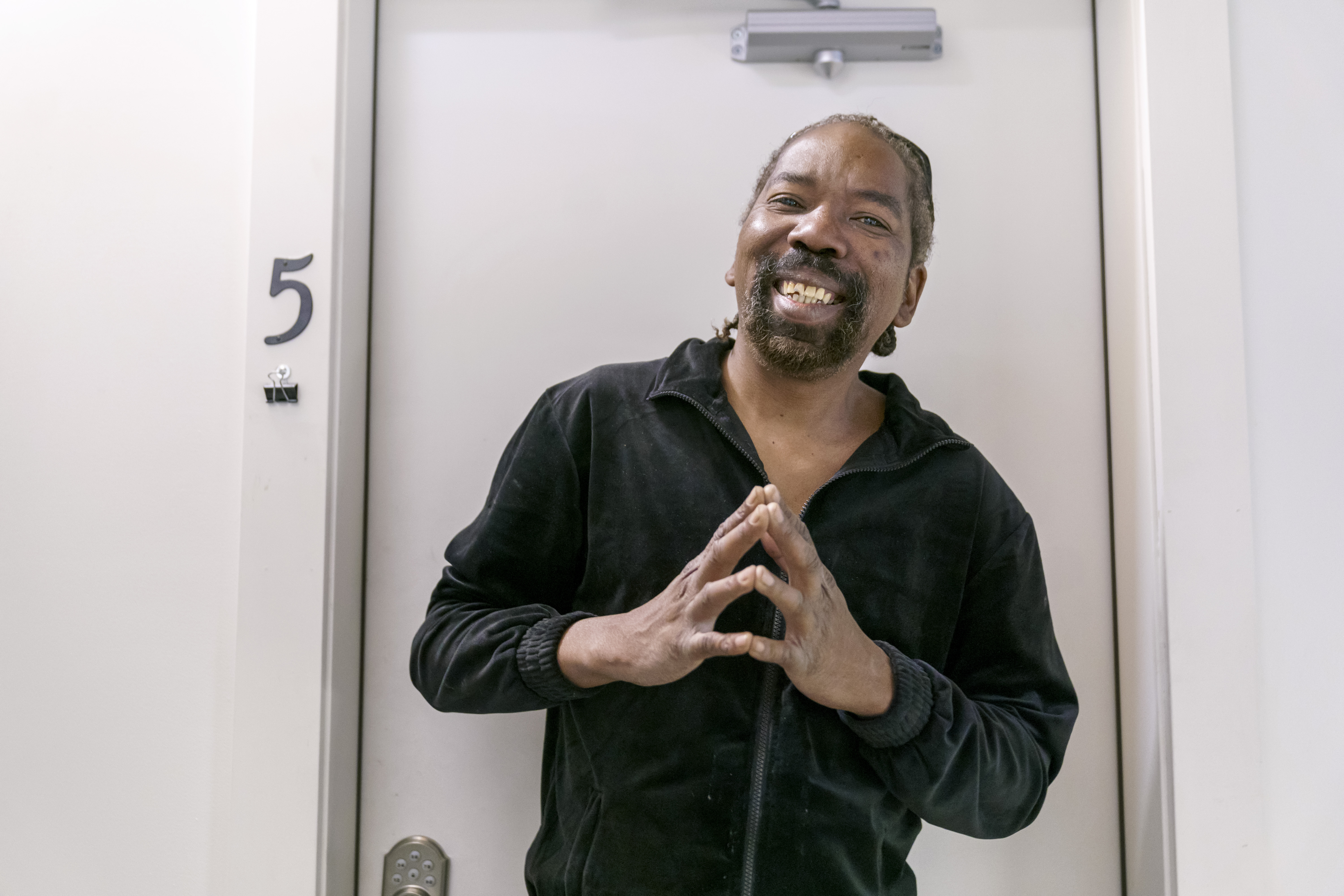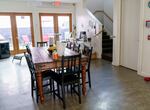
Marlon Crump stands outside his apartment.
Kristyna Wentz-Graff / OPB
Marlon Crump struggled with homelessness for more than a decade. But for the past two years, he’s had stable housing in Portland.
He lives in a newer, mixed-use building on a corner lot in the city’s Creston-Kenilworth neighborhood. Businesses are at the bottom of the blue, two-story development. Three apartments are on the top level. Two of them are market rate, but the last one is a single room occupancy, or SRO, apartment with 11 beds. That’s where Crump lives, in room number five.
The setup is similar to college dorm living, where each resident has their own personal room and everything else is shared: kitchen, living and dining room, bathroom and laundry facilities. There’s even a private courtyard, complete with patio furniture and a grill.
“I definitely don’t take this for granted, living here,” Crump said. “I know what it was like to really crawl through that road, to finally get peace of mind in my own sanctuary.”
He first heard about this place from a social worker in December 2019. They helped him get a tour.
“I saw the room and I was like wow, very nice,” Crump said. “I think I could live here.”
Crump could afford the $475 a month rent using his monthly social security check. So he signed the lease and moved in.
The process was quick and smooth, and it was designed to be that way through a concept known as master leasing.

The apartment’s communal area includes a full kitchen, a dining area and indoor and outdoor living spaces areas.
Kristyna Wentz-Graff / OPB
According to Multnomah County’s latest homeless point-in-time count, the number of people experiencing homelessness in the county has grown. Other counties in the region saw a similar increase. Public officials, political candidates and just about every Oregonian has thoughts on how to address homelessness. One idea is to scale up the use of master leasing. It’s also one of the main asks in 3,000 Challenge PDX, a pitch from a coalition of Portland homeless service providers and advocacy groups to get 3,000 people housed by the end of 2022.
This idea is not new. It’s used for things like investment properties in real estate, essentially adding another party into a landlord-tenant relationship.
In Crump’s case, instead of renting directly from the building’s landlord, he’s renting from the unit’s master leaseholder, the homeless services provider, JOIN.
The nonprofit provides the flexibility that many people who’ve been living on the street or bouncing around in shelters need to get back into stable housing.
“It also has a great benefit in giving us the opportunity to [get to] know landlords and be able to place clients in situations where they have a higher probability of succeeding,” said Tony Robertson, JOIN’s landlord recruitment and retention program coordinator.
JOIN began master leasing in 2015. Robertson’s team handles a lot of the usual landlord logistics like turning over units and handling deposits. And other workers from JOIN help clients fill out and understand paperwork.
The nonprofit is meticulous about finding the right housing fit for each person, preparing them for communal living and providing ongoing housing support after residents move in. JOIN also provides social services to help residents connect to their new community and neighborhood, as well as finding jobs. JOIN typically pairs two of its staff members per client in a master leased unit to provide support.
“We’re just not trying to place [people] just for the sake of placing,” Robertson said. “We’re trying to put them in situations where they can take pride in where they live and feel good about where they are.”
And with JOIN, clients looking for housing don’t have to worry as much about having a bad credit score, negative payment history or things like an old misdemeanor charge.
Homeless nonprofits are just more understanding than a typical landlord, said Steve Berg, vice president for programs and policy at the National Alliance to End Homelessness.
“[Master leasing] is very helpful for somebody who’s been [living] on the street,” Berg said. “Trying to engage in a transactional relationship with the landlord is just asking a little much.”
Landlords who sign up for master leasing may enjoy the hands-off approach. They don’t have to vet potential tenants and they get guaranteed rent, even if some of the leased out units are empty.
Making lives ‘infinitely better’
Master leasing to house people experiencing homelessness has been in practice in the U.S. for decades in cities like New York and San Francisco.
Berg said San Francisco pioneered its Direct Access to Housing master lease program with its local health department in the late 1990s. It subsidized SRO units through master leases and began housing high-risk homeless people.
A study on the effort found the program was a huge cost-saver for the city. It saved more than $30,000 per household, mostly from healthcare costs.
“The people who got into housing weren’t going to the hospital nearly as much and they weren’t going to jail nearly as much,” Berg said. “That saved the city a lot of money and made those people’s lives infinitely better.”
Master leasing also came into wide use amid the pandemic. Several cities across the nation utilized it to quickly house people especially vulnerable to COVID-19 who were living on the street. The United States Department of Housing and Urban Development even released guidance for cities and organizations looking to use master leasing in July 2021.
Homelessness’ silver bullet?
Using a master lease to quickly house people might sound like a no-brainer. But it’s no silver bullet to end homelessness.
Though San Francisco does have a successful SRO master lease program, others overseen by the city are notorious for their unlivable conditions. Money and a lack of oversight is the big problem there.

The single room occupancy apartment sits on the top of a two-story building in Portland’s Creston-Kenilworth neighborhood. JOIN helps residents maintain the interior and exterior of the building.
Kristyna Wentz-Graff / OPB
Staff at JOIN agree that adequate funding is essential to hire more social workers, for rental assistance and the general upkeep of leased properties to keep both landlords and residents happy.
“It takes money in order to do that,” Robertson said. “It takes painting and fixtures and lawn care and things like that to make [clients] feel good about their new living situation.”
Also, negotiating master lease terms can become complex.
John Paul Kelly is a supportive housing team coordinator for the Portland-based social services nonprofit Central City Concern. Kelly said CCC looked into master leasing about four years ago when it tried to relocate some of its clients quickly. Negotiations became arduous once lawyers got involved.
“It was bickering over who is going to have responsibility,” Kelly said. “At the end, it became too complicated and we backed out.”
Also, some homeless service providers might not want to take on a landlord role with all the responsibilities that come along with it.
Still, Kelly said using master leasing to create more housing opportunities can work under the right conditions.
“It’s another tool in a very, very small toolbox and we have to use every little bitty tool we can get our hands-on,” Kelly said.
And with rent continuing to rise and inflation barely easing, using master leasing as a way to quickly house people could become standard practice in Portland.

Marlon Crump heads upstairs to his apartment on April 7, 2022 in Portland.
Kristyna Wentz-Graff / OPB
So far, JOIN’s master lease deal with Crump has worked out well. The space might seem small, but it’s a huge step up from sleeping on a sidewalk or on a mat in a shelter.
Crump doesn’t plan on leaving anytime soon. He said having his own sanctuary is a weight off his shoulders, as well as his heart.
“I’m very blessed to be here, very blessed,” Crump said. “I’m even more grateful that JOIN has provided us with a lot of concretable solutions towards keeping and maintaining our housing.”



